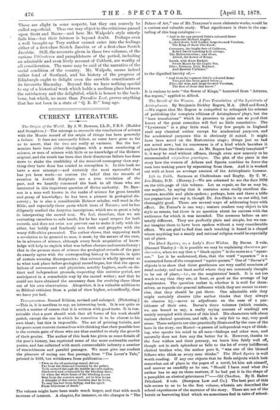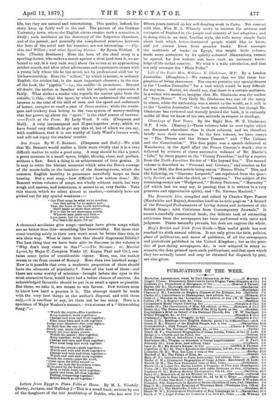The Black Squire ; or, a Lady's Four Wishes. By
Davus. 3 vols. (Samuel Tinsley.)—It is possible we may be explaining obscurum per obscurius, when we say that a "black squire" is the same as a " squar- son." Let it be understood, then, that the word " squarson " is a contracted form of the compound "squire-parson." One of "Davits's" objects is to show that these gentlemen are very useful members of rural society, and not least useful where they are commonly thought to be out of place,—i.e., on the magistrates' bench. It is not to much to say that they are, at least, as good as the average of lay magistrates. The question rather is, whether it is well for them- selves, as regards the general influence which they are meant to exer- cise, that they should be put there. One admirable rule they might certainly observe (the author thinks that they always do observe it),—never to adjudicate on the case of a par- ishioner of their own. Davaues three volumes (which contain, we are bound to Bay, a really trying amount of reading) are mainly occupied with themes of this kind. His characters talk about various clerical questions, and talk, it is only fair to say, very good sense. These subjects are also practically illustrated by the case of the hero in the story, one Martel—a parson of independent ways of think- ing, who speaks his mind to all men—bishops and other men, and naturally does not fare any the better for it. However, thanks to the four wishes and their potency, we leave him fairly well off, though not in such splendour as falls to the lot of every indifferent clerical brother who, the author puts it, "was one of the blessed fellows who think as every man thinks." The Black Squire is well worth reading. If any one objects that he finds subjects which look somewhat out of place in the pages of a novel, let him ask nimselk and answer as candidly as he can, "Should I have read what the author has to say on these matters, if ha had put it in the shape of a pamphlet on clerical grievances ?"—Old Charlton. By H. Baden Pritchard. 3 vole. (Sampson Low and Co.) The best part of this tale seems to us to be the first volume, wherein are described the school experiences of the narrator of the story. These are not of the heroic or harrowing kind which we sometimes find in tales of school-
life, but they are natural and entertaining. This quality, indeed, the story keep up fairly well to the end. The picture of the German University town, where the English circus creates such a sensation, is lively ; such incidents as the discovery of the forgotten chambers, and of the pursuit, and generally the complicated relations between the hero of the novel and his enemies, are not interesting.—Pig- -skin and Willow ; and other Sporting Stories. By Byron Webber. 3 vols. (Tinsley Brothers.) Here the hero of the chief story is a sporting doctor, who makes a match against a rival (and does it, we are bound to say, in a very rude way) about the scores at an approaching cricket-match, and after other adventures and experiences, elopes with a young lady whose life he has saved, not by professional skill, but by his horsemanship. Here the "willow," by which is meant, in ordinary English, the cricket-bat, is the most important element ; in the rest of the book, the "pigskin "—i.e., the saddle—is prominent. Beyond all doubt, the author is familiar with his subject, and represents it fairly. What strikes a reader who regards the matter quite from the outside, is this,—that the sport, by which we understand the natural interest in the trial of the skill of men and the speed and endurance of horses, occupies so small a part of these stories ; while the strata- gem and trickery that belong to the vast system of money-making that has grown up about the "sport," is the chief source of interest. —Youth at the Prow. By Lady Wood. 3 vols. (Chapman and Hall). A very inconsequent and ill-put-together story, which we have found very difficult to get any idea of, but of which we can say, with confidence, that it is not worthy of Lady Wood's former work, and will not repay the readers' trouble.



































 Previous page
Previous page